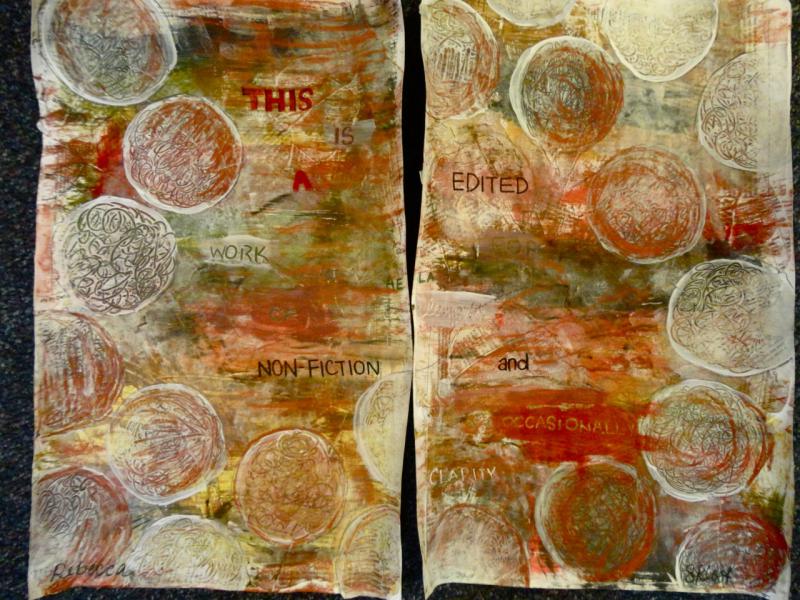Serendip is an independent site partnering with faculty at multiple colleges and universities around the world. Happy exploring!
Digital Humanities on Serendip
|
from leamirella's digital project, "Discovering Henrietta Lacks" |
The Digital Humanities constitute a paradigm shift in the field of literary studies, attending to practices and qualities in any medium, reaching beyond print in modes of inquiry, research, publication, and dissemination. In this "massive theoretical shift in textual studies," print is absorbed into new hybrid, multimodal communication practices: time-based forms (film, sound, animation), visual traditions (graphics, design), spatial practices (architecture, geography), and curatorial practices (museums, galleries). In the digital humanities, the single most important issue is a matter of scale, which changes the amount of text, contexts, and contents of questions. Distance becomes a condition of knowledge, encouraging focus on units smaller (devices, themes, tropes) or larger (genres, systems) than the text (many thanks to Katherine Hayles for the key elements of this summary). |
Bryn Mawr Courses in the Digital Humanities
Literary Kinds, Emerging Genres (Fall 2011)
- Re-thinking Genre as a Gift Economy
- Mawtyrs Going Digital
- Imagining a New Topography
- Thinking More About Collaboration
- Talking About Breaking!
- Present and Future, Writing and Thinking
- Making Room for Everyone?
Literary Kinds: Thinking Through Genre, From Blogs to….? (Spring 2010)
- What the Internet, and Globalization, is Doing to our Intellectual Lives
- A Conversation with "Easily Distracted"
- A Conversation with "Serendip"
- A Conversation with "Geeky Mom"
- Teaching an Old Genre New Tricks
- Thinking Rhizomically
- Reporting in on our Rhizomic Discussion
-
Student Reflections on the Digital Humanities
Bridging the Divide
Intellectual Property & Where Do We Go From Here
Internet and Intellectualism
Rethinking Originality
The Rare Defense of Wikipedia
Manifest in Utopia
More Chatter: Thoughts on the Digital Humanities
Gender, Information, Science and Technology (Spring 2011)
- Paneling Gender and Technology through Time and Space: Historically, Geographically….
- Digital thinking and re-thinking
- Taking Information Seriously
- Head Games
-
More Student Reflections on the Digital Humanities
Reflection on Gender, Information, Science and Technology
Reading on the Internet
A Brief Look at Hofstadter's Gödel, Escher, Bach: An Exercise in Reading and Decoding
From Circuits to Sentience: An Introduction to Digital History and Ethics
Master of Science in Library and Information Science
Character Building in the Digital Humanities
Engaging the Digital Humanities
Being a Digital Human
Teaching the Digital Humanities
An Advantage, or Disadvantage?
Considering an Independent Major in Digital Humanities
Teaching Film as Digital Humanities Scholars
Defining Information
Traditional Humanities and Digital Humanities in Conversation
Bookmarks: Technologies of Writing and Reading, Ancient to Contemporary
Open Faculty Discussion on Evolving Systems
- From evolving systems to world literature and back again
- Deep Time, Deep Space, Deep Play: Writing (to) the Future
Guest Exhibitions: Art and Science on Serendip
Roundtables for the Society for Literature, Science and the Arts
- From Encoding, through Decoding, to Transformation
- "Accessing Wonderland": Seeing, Speaking and Writing from the Brain's Point of View
Sources beyond Serendip
Tri-Co Digital Humanities
A Digital Humanities Manifesto 2.0
A Digital Humanities Manifesto
Beyond the Dissertation Monograph (MLA Newsletter, Spring 2010)
Planned Obsolesence: Publishing, Technology, and the Future of the Academy
Stanford Humanities Laboratory: Crowds
Lewis Hyde, Common as Air: Revolution, Art and Ownership
Cathy Davidson, Now You See It: How the Brain Science of Attention will Transform the Way We Live, Work and Learn
Katherine Hayles, How We Think: Transforming Power and Digital Technologies



